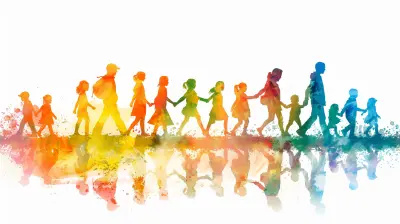Mental Health Breakdowns and Breakthroughs in Postpartum
21 September 2025
Becoming a mother changes everything. Your routine, your body, your sleep (what sleep, right?), and – maybe most significantly – your mental health. While society paints a picture of glowing skin and peaceful snuggles, the reality is often more complex. Postpartum isn't just about cute baby onesies and Instagram-worthy nursery shots. It's also about navigating the emotional roller coaster that can leave new moms feeling overwhelmed, anxious, and sometimes lost. Let's dive into the ups and downs — the mental health breakdowns and the incredible breakthroughs — that come during the postpartum journey.
What Exactly Is Postpartum?
Postpartum refers to the period after childbirth, typically considered to last about six weeks. But mentally and emotionally? It can stretch much longer. While your body is healing, your hormones are dropping and shifting faster than you can say “diaper blowout,” and your entire identity is doing a backflip.For some moms, it’s a joyous time. For others, it feels like living in a fog, each day passing in a haze of tears, anxiety, and self-doubt. And for many, it’s both — joy and struggle wrapped up in one messy, beautiful package.
The Reality of Mental Health Breakdowns
Let’s start by acknowledging something important: postpartum mental health struggles are not a sign of failure. They’re common, they're real, and they deserve serious attention.What Do Mental Health Breakdowns Look Like Postpartum?
The signs might be subtle at first or hit you like a truck on no sleep. Some common symptoms include:- Feeling constantly overwhelmed
- Crying more than usual (and not just when your baby cries)
- Trouble bonding with your baby
- Intense irritability or anger
- Difficulty sleeping even when the baby sleeps
- Racing thoughts or intrusive worries
- Fear of being a bad mom or not doing things “right”
Sound familiar? You’re not alone. Mental health challenges postpartum can take several forms, including:
1. Postpartum Depression (PPD)
This goes beyond the “baby blues.” PPD sticks around longer and hits harder. It makes you feel hopeless, disconnected, and deeply sad — often without any obvious reason.2. Postpartum Anxiety (PPA)
This is like living with a constant knot in your stomach. Your mind races, thinking about all the “what ifs” — what if the baby stops breathing, what if I drop her, what if I’m not enough?3. Postpartum OCD, PTSD, and Psychosis
Less common, but extremely serious. These require immediate professional help. Symptoms might include obsessive thoughts, flashbacks from a traumatic birth, or hallucinations.
Why Does This Happen?
Oh, the list is long. But it usually comes down to a storm of physical, emotional, and situational changes:- Hormonal shifts – Estrogen and progesterone drop like a rock after delivery.
- Sleep deprivation – You’re lucky if you get a solid two hours.
- Isolation – Especially if your support system is limited.
- Identity crisis – You’re still you, but now you’re someone’s mom, too.
- Pressure to be perfect – Thanks, social media.
And let’s not forget, recovery from childbirth itself can feel like being hit by a bus — whether you had a vaginal birth or a C-section.
Breaking the Silence: Let’s Talk About It
Here’s the thing: For way too long, there’s been shame and silence around postpartum mental health. Many moms feel like they have to suck it up, smile through the tears, and just be grateful they have a healthy baby.But that’s not how healing works.
You can love your baby and still struggle. You can be a good mom and still need help. You can have a beautiful family and still feel like something’s not quite right inside.
And guess what? Talking about it is the first step toward healing.
Breakthroughs That Change Everything
Now let’s shift gears. Because while the breakdowns are real and raw, they can also lead to something powerful — breakthroughs. When you face your mental health head-on, lean into support, and start to heal? That’s where the magic happens.Reaching Out for Help
This might mean:- Talking to your doctor or a therapist
- Joining a postpartum support group (online or in-person)
- Opening up to your partner, family, or a trusted friend
Asking for help isn’t weakness. It's wisdom. It’s brave. It’s often the first domino that leads to healing.
Therapy Works
Whether it’s cognitive behavioral therapy (CBT), EMDR for trauma, or even just regular talk therapy, working with a professional can be life-changing. It gives you a safe space to unpack your feelings, build coping skills, and start reconnecting with yourself.Medication Is Not A Shameful Option
Sometimes, your brain needs a little chemical support. Antidepressants or anti-anxiety medications can help rebalance what's out of whack. Always consult a qualified doctor to find what works for you safely, especially if you're breastfeeding.Establishing Your New Identity
This one's huge. Motherhood can feel like you’ve lost yourself. But guess what? You’re still in there — and maybe even a stronger, more resilient version of yourself. Part of the breakthrough process is re-learning who you are now and embracing that evolution.Reclaiming Little Joys
It starts small — a hot shower, an episode of your favorite show, five minutes of silence with coffee. As your mind begins to heal, joy sneaks back in, little by little.And those tiny wins? They add up. Before you know it, you’re not just surviving — you’re finding moments where you genuinely feel okay... and eventually, even happy.
How Partners and Loved Ones Can Support
If you’re reading this as someone who loves a new mom — listen up. You don’t need to fix everything (you can’t). But you can make a massive difference.Here’s how:
- Ask how she’s really doing. And wait for the answer.
- Let her sleep, even if it means bottle-feeding or taking the baby out for a walk.
- Validate her feelings instead of brushing them off.
- Encourage her to seek help if things feel off.
- Cook a meal. Do the laundry. Take on more than “your share.”
Support doesn't have to be grand gestures. Sometimes, love is just taking out the trash without being asked.
The Long-Term View: The Road Isn’t Linear
Healing isn’t a straight line. There will be good days, bad hours, middle-of-the-night cries, and random bursts of laughter that remind you that you’re still in there.What’s important is not perfection, but progress.
Some days, the breakthrough is just getting out of bed. On others, it’s finding your smile again. Celebrate it all.
When to Seek Immediate Help
Most postpartum mental health struggles are treatable. But some signs require immediate attention:- Suicidal thoughts
- Thoughts of harming your baby
- Hallucinations or delusional thinking
- Complete detachment from reality
If you're experiencing any of these, please — talk to a medical professional right away. Your life matters, and help is available.
Final Thoughts: You’re Not Alone, Mama
Postpartum can crack you open in the most unexpected ways. But here's the thing — those cracks? They're the places where the light gets in. Every tear, every dark night, every anxious thought is part of the transformation.You don’t have to hide your pain to be a good mom.
You don’t have to pretend everything is fine.
You are worthy of support, healing, and peace.
So, from one tired-but-hopeful soul to another: take a deep breath. You’re doing better than you think. And the breakthrough? It’s on its way.
Quick Tips for Nurturing Your Mental Health Postpartum
- Sleep when you can (yes, really)- Eat regular meals, even if it's just a granola bar
- Stay hydrated – water is life
- Get fresh air daily, even if it’s just standing on the porch
- Say “no” to things that drain you
- Say “yes” to help – always
- Stop doom-scrolling social media comparisons
- Keep a journal or voice note diary – let it all out
- Check in with your doctor regularly
- Celebrate even the smallest wins
You will get through this. And on the other side? A stronger, wiser, deeply transformed version of you.
all images in this post were generated using AI tools
Category:
Postpartum RecoveryAuthor:

Kelly Snow
Discussion
rate this article
1 comments
Juno Benson
What fascinating insights! I'm curious about the common triggers for postpartum mental health challenges and the breakthroughs that parents experience. How can we better support each other during this journey?
October 4, 2025 at 4:21 PM

Kelly Snow
Thank you! Common triggers for postpartum challenges include hormonal changes, sleep deprivation, and isolation. Breakthroughs often come from connection, support, and open communication. We can better support each other by sharing experiences, creating supportive spaces, and prioritizing mental health awareness.


